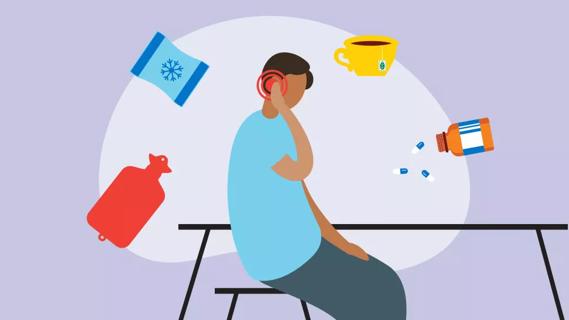Advertisement
Here’s what experts recommend if you’re venturing out to a concert or music festival

When COVID-19 emerged, the live music industry shut down for safety. Social distancing was impossible at crowded venues, either inside or outside. Due to the nature of their jobs, venue and touring road crews also worked and traveled in close proximity — another potential health hazard.
Advertisement
Cleveland Clinic is a non-profit academic medical center. Advertising on our site helps support our mission. We do not endorse non-Cleveland Clinic products or services. Policy
Singing can also expel virus-infected droplets into the air — and these droplets are known to accumulate and linger in the air for a sustained period of time in crowded indoor spaces. In other words, a concert might be a superspreader event rather than a relaxing night out.
With vaccines becoming more widespread, summer concert and festival schedules are filling in. The CDC reported that as of August 4, 67.9% of Americans age 12 and up have had at least one vaccine dose. That means more people are checking out live music at packed venues — many for the first time in well over a year.
However, as COVID-19 cases continue to rise across the U.S. due to the more contagious delta variant, are concerts or festivals safe to attend? Infectious disease specialist Donald Dumford III, MD, MPH, shares his thoughts on easing back into seeing live music.
Fans were understandably excited when vaccines cleared the way for musicians to get back on the road. However, is it safe right now to go to an indoor concert?
“With the new information we’re getting on the delta variant, I’m a little bit hesitant to say yes,” says Dr. Dumford. That’s because this COVID-19 strain is more transmissible than other ones: Scientists have found that one person infected with the delta variant could spread the virus to eight other people. And a CDC report on a recent COVID-19 outbreak in Massachusetts found vaccinated and unvaccinated people had comparable viral loads.
Advertisement
“Even people who have been vaccinated might still be able to spread the virus,” Dr. Dumford says. “If people choose to go to an indoor concert, they should wear masks in that location.”
Even if an indoor venue operates at reduced capacity, Dr. Dumford says masking is still a good idea. Living in an area with low COVID-19 transmission rates also doesn’t change his advice. “I’d still plan to wear a mask if I was in a low transmission setting,” he says. “Just because then you’re like, ‘Well, what’s low? When do we go from that low to high?’”
As COVID-19 case numbers increase around the country, some indoor venues are taking steps to protect performers, staff and audience members. For example, most Broadway theaters are requiring show attendees be fully vaccinated and wear masks during performances.
Other spaces have slightly different guidelines. For example, a concert venue in New Jersey requires patrons to be fully vaccinated and wear masks while waiting in line. However, once inside, masks can be removed.
Dr. Dumford says that scenario — vaccinated people congregating indoors while unmasked — gives him pause considering current statistics with the delta variant.
“If you have a large number of vaccinated people together — even though being fully vaccinated reduces the likelihood for you to acquire the virus — the people that acquire the virus are going to be just as contagious as somebody who wasn’t vaccinated,” Dr. Dumford says. “Even if you’re in with vaccinated people, and you’re indoors, I would wear a mask.”
Last year, in lieu of indoor live music, many venues pivoted and presented intimate outdoor shows. Those have continued in 2021, joined by higher-capacity concerts and music festivals at traditional outdoor music venues.
Dr. Dumford says even fully vaccinated attendees should continue to follow many of the same guidelines they did last year.
“With outdoor shows, I would do your best to be socially distanced,” he says. “If you can’t be socially distanced, I would recommend wearing a mask. It’s much safer to be in an outdoor location than an indoor location. But I worry with the new variant that even the outdoor locations are at risk.”
At music festivals, which can draw tens of thousands of people, Dr. Dumford recommends avoiding places that can become crowded.
“The spots where you’re going to be huddled together are going to be at the entrance, and then probably food lines, drink lines and restrooms. Those are going to be places where you’re also more likely to be crowded.”
By extension, while it’s exhilarating to be shoulder-to-shoulder at the front of the stage cheering on a band, or sitting on a lawn full of people listening to music, having space around you is key.
“COVID-19 is still almost completely a respiratory pathogen that spreads by aerosol droplets,” Dr. Dumford says. “So the biggest thing as far as safety with these types of transmission events is social distancing and masking.”
Advertisement
Many concert venues around the U.S. have started requiring ticket-holders to show proof of vaccinations for entry. New York City also announced it would soon require patrons to show proof of vaccination at indoor restaurants, gyms, and movie theaters.
Does requiring proof of vaccination at events and activities change the level of safety? “It does reduce the risk,” says Dr. Dumford. “Even though we’ve seen breakthrough cases, and those people with breakthrough who are vaccinated are just as contagious as the unvaccinated, you are eight times less likely to acquire COVID if you are vaccinated.”
“With that being said, I would still endorse masking in indoor venues even if there is a proof of vaccine requirement,” he adds.
Instead of proof of vaccination, some music events allow patrons to provide a negative COVID-19 test completed within a certain time frame, such as 72 hours or less. However, a COVID-19 outbreak linked to a Dutch music festival underscores the limitations of this option.
“You might have been exposed, but you’re not to the point where you could actually detect the virus yet,” says Dr. Dumford.
Plus, not only is the delta variant is more contagious, but its transmission time is shorter than other strains of COVID-19. “With the new variant, instead of being exposed, and then being able to start spreading the virus after about four to five days, that timeframe has really shortened up to two days,” he says. “The virus’s spread is really escalated.”
Advertisement
Although that means you’ll know sooner if you’re sick, that also means you’ll start passing on the virus sooner. “The virus replicates very quickly with this variant,” Dr. Dumford says. “It starts to pump out a lot of the virus very quickly.”
The best solution to reduce delta variant transmission is to follow masking and social distancing guidelines and get vaccinated.
“As we’re already in festival season, if somebody who’s not vaccinated is thinking about it, they should definitely get vaccinated right now,” Dr. Dumford says. “The people we’re seeing in the hospital right now are those who are unvaccinated.
“Even in breakthrough cases, those people are getting mild illness as opposed to people who are unvaccinated and are at risk for getting severe illness,” he adds. “By getting vaccinated, you’re protecting yourself, and you’re protecting those around you.”
Advertisement
Learn more about our editorial process.
Advertisement

Infection and inflammation can cause you to lose your voice and have other voice changes until you’re fully healed

A COVID-19 infection can bring on depression or anxiety months after physical symptoms go away

Ground yourself in evidence, name your thoughts out loud and meet yourself in the middle to help defuse worst-case scenarios

Start by naming your emotions, centering your physical symptoms and identifying how your past impacts your present

Just like the flu, COVID-19 continues to evolve every year with new and smarter variants

Among its other effects, discriminating against people with disabilities hurts their health and well-being

‘Mind your manners’ by watching your language, challenging your assumptions and apologizing when you fall short

The latest omicron subvariants carry specific mutations that may allow the SARS-CoV-2 virus to be better at evading immune protection

Not all ear infections need antibiotics — cold and warm compresses and changing up your sleep position can help

A glass of lemon water in the morning can help with digestion and boost vitamin C levels, and may even help get you into a better routine